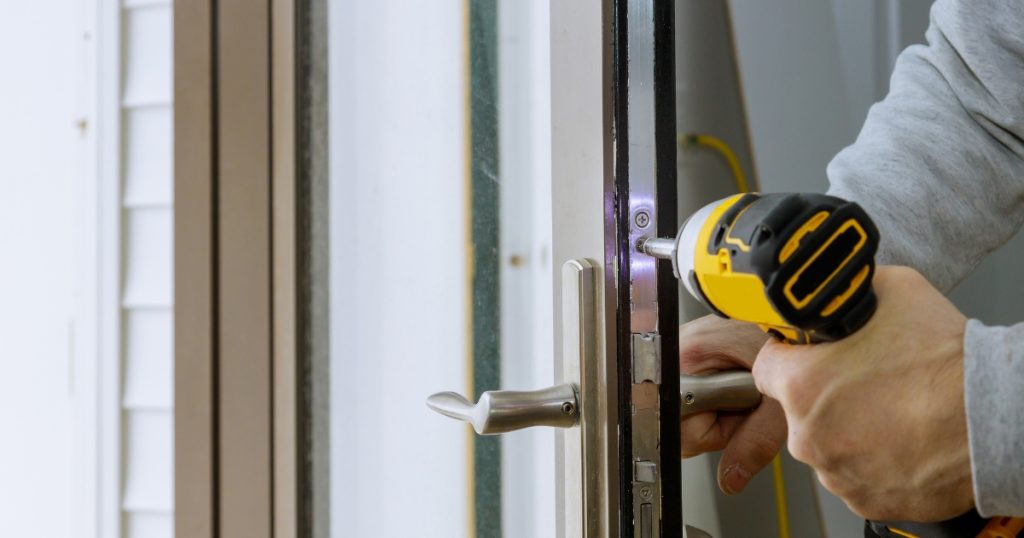A secure door lock is an essential component of any home security system. Over time, door locks can become less effective due to wear and tear, or you may simply desire an upgrade for aesthetic or functional reasons.
Changing your door lock may seem like a daunting task, but with the right knowledge and tools, it can be a straightforward process.
In this comprehensive guide, we will explore the reasons for changing your door lock, the different types of door locks available, and the factors to consider before making a change.
We will also provide step-by-step instructions for changing your door lock and discuss the benefits of hiring a professional locksmith.
Why Change Your Door Lock?
There are several reasons why you might consider changing your door lock, including security, aesthetic, and functional purposes.
Security Reasons
One of the primary reasons to change your door lock is to enhance the security of your home. If your current lock is outdated or has been compromised, upgrading to a more secure lock can offer added protection against potential break-ins. Common security-related reasons to change your lock include:
- Lost or stolen keys
- Recent break-in or attempted break-in
- Moving into a new home or rental property
- Outdated or low-quality lock
Aesthetic Reasons
Another reason to change your door lock is to improve the appearance of your door and overall home exterior. Upgrading your lock to a more modern or stylish design can significantly enhance your home’s curb appeal. Additionally, changing the door lock can be part of a broader home renovation project, such as repainting your front door or replacing the door hardware.
Functional Reasons
Finally, you might change your door lock due to functional issues. Over time, locks can become difficult to operate, keys may get stuck, or the lock may no longer provide a tight seal when the door is closed. In such cases, replacing the lock can help restore functionality and ensure that your door operates smoothly.
Factors to Consider Before Changing Your Door Lock
When choosing a new door lock, there are several factors to consider, including door material and compatibility, security level, lock installation, budget and aesthetics, and local regulations.
Door Material and Compatibility
The type of lock you choose should be compatible with your door material. Wood, metal, UPVC, and composite doors each have different requirements and may require specific lock types. Additionally, the thickness of your door will determine the size of the lock and the required installation hardware.
Security Level
Consider the security level you require for your door lock. Deadbolts and Euro cylinder locks with multipoint locking systems generally offer the highest level of security, while knob and lever handle locks are less secure. Smart locks provide added security features, but their reliability may depend on the specific model and manufacturer.
Lock Installation
Consider whether you are comfortable installing the lock yourself or if you will need to hire a professional locksmith. Some locks, such as deadbolts and Euro cylinder locks, may require more advanced installation techniques and tools, while others, like knob and lever handle locks, are relatively simple to install.
Budget and Aesthetics
Your budget and aesthetic preferences will also play a role in your decision. Lock prices can range from affordable to expensive, depending on the type and brand. Additionally, locks are available in various styles and finishes to suit your home’s design and decor.
Local Regulations
Before changing your door lock, check if there are any local regulations or building codes that require specific types of locks or security features. Some homeowner associations or insurance providers may also have specific requirements for door locks to maintain coverage or compliance.
Additional Door Lock Features
When selecting a new door lock, you may also want to consider additional features that can enhance the security, convenience, and usability of your lock.
Some of these features include:
Key Control
Key control refers to the ability to limit unauthorized duplication of your keys. High-security locks often come with patented keyways, which require specialized equipment and authorization to duplicate keys. This can help prevent unauthorized access to your home and increase overall security.
Anti-Drill and Anti-Pick Features
Many modern locks include features designed to resist common forced entry techniques, such as drilling or picking. Anti-drill features may include hardened steel pins or plates that protect the lock cylinder from being drilled out. Anti-pick features can include specialized pins or mechanisms that make it more difficult for intruders to manipulate the lock’s internal components.
Weather Resistance
If you live in an area with extreme weather conditions, consider choosing a lock that is specifically designed to resist corrosion, rust, and other forms of damage caused by the elements. Weather-resistant locks are typically made from materials like stainless steel, brass, or other corrosion-resistant alloys.
Fire Rating
Some locks are designed to withstand high temperatures and maintain their integrity during a fire. Fire-rated locks can provide added protection for your home and may be required by local building codes or insurance providers.
Other Home Security Measures
While upgrading your door lock is an essential step in enhancing your home’s security, it’s also important to consider additional security measures that can help protect your property. Some of these measures include:
- Installing a security system with cameras, motion detectors, and window and door sensors
- Adding exterior lighting to deter intruders and improve visibility around your property
- Reinforcing door frames and hinges to resist forced entry
- Installing window locks or security bars to prevent unauthorized access through windows
- Regularly inspecting and maintaining your home’s security measures, including locks, security systems, and other hardware
By taking a comprehensive approach to home security, you can create a safer environment for yourself and your loved ones, giving you peace of mind knowing your property is well-protected.
Frequently Asked Questions
Here are some frequently asked questions related to changing door locks:
Can I rekey my existing lock instead of replacing it?
In some cases, you may be able to rekey your existing lock instead of replacing it entirely. Rekeying involves changing the internal components of the lock so that it operates with a new key. This can be a more cost-effective option if you want to change the keys for security reasons without upgrading the lock itself.
Can I install a smart lock on any door?
Most smart locks are designed to be compatible with standard door sizes and configurations. However, it’s essential to check the specific requirements for the smart lock you are considering, as some models may have unique installation requirements or may not be compatible with certain door materials or styles.
How often should I replace my door lock?
There is no specific timeline for replacing door locks, as the longevity of a lock depends on factors such as usage, maintenance, and the lock’s overall quality. However, it’s a good idea to replace your lock if you notice signs of wear, damage, or decreased functionality. Additionally, consider upgrading your lock if it is outdated or does not provide the level of security you require.

